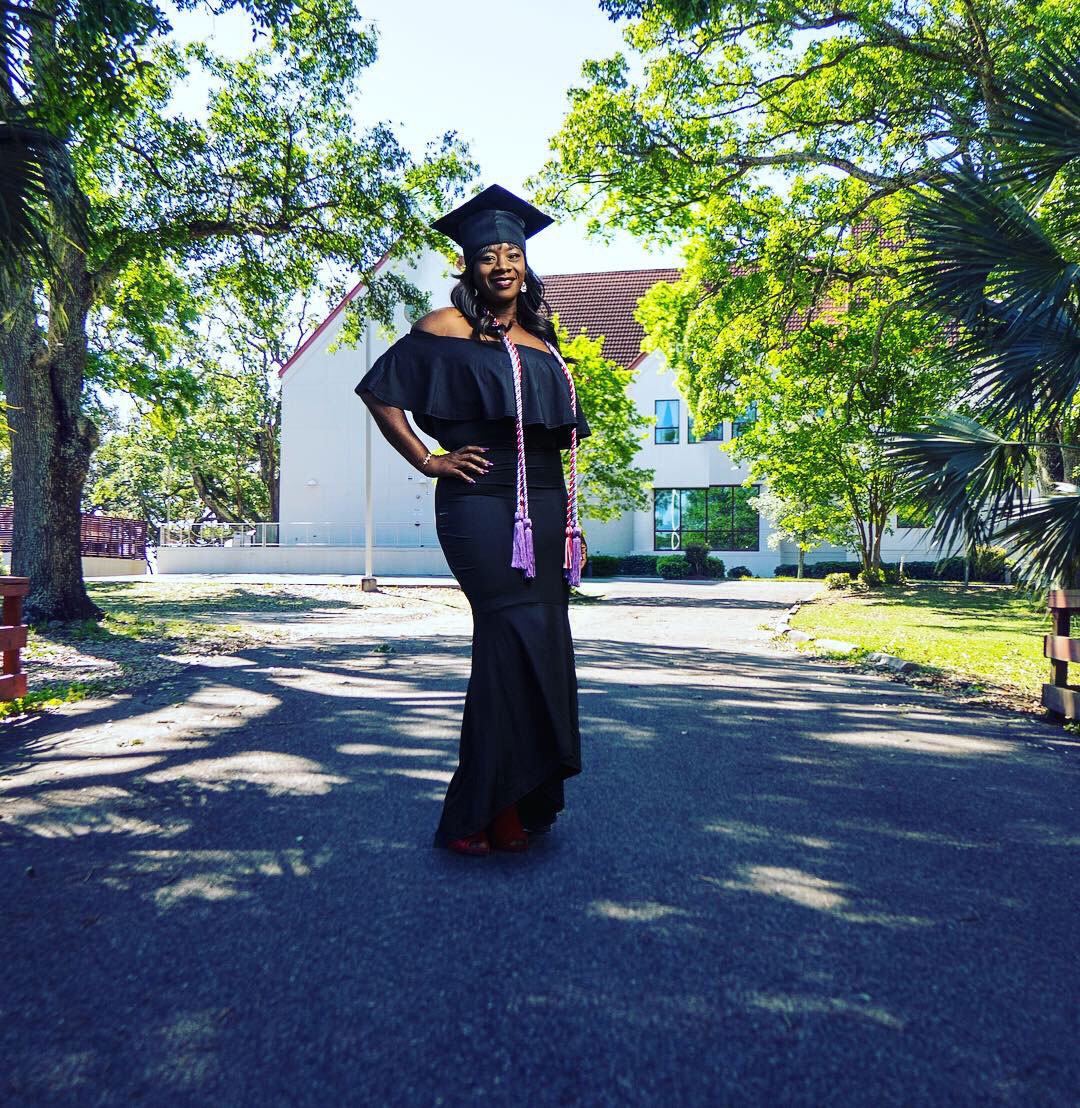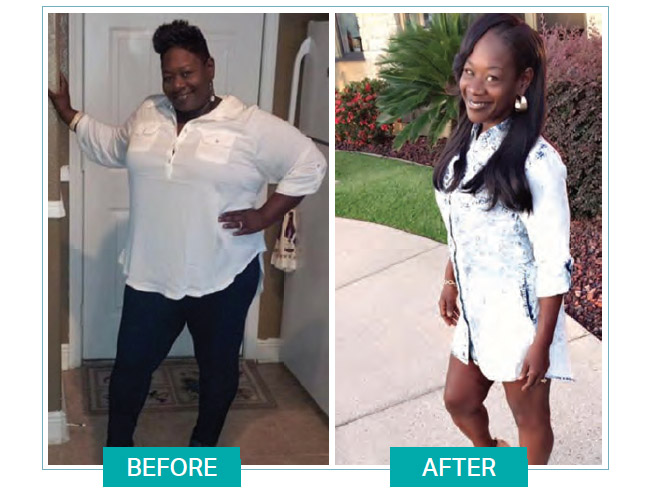BEFORE MY TRANSFORMATION
Six years ago, I looked at a picture that a friend had taken of me. I was standing there, 265 pounds, 5 feet 1 inch tall, wearing a size 24/26. Unlike most of the pictures I took — mainly head shots — this one was uncropped, unfiltered and off-guard. I instantly became sad, and I was forced to deal with the fact that not only was I fat, but morbidly obese. I had gotten so big that I stopped shopping for clothes and only bought things that didn’t need a size, like purses and earrings. My body ached constantly, and the more I thought about losing weight, the more I ate — and the more I gained. I was extremely depressed and had a low self esteem. I made horrible decisions and did not care about myself anymore.
This day was the final straw, and I was tired of feeling like I felt and looking like I looked. I began reading self-help books and listening to motivational speeches about self-love. One day during this journey, I resolved to do something about my weight. I decided to try diet pills, but that was only effective for so long. I started working out, but I was in extreme pain due to my weight and could not keep that up, either. I reached out to a close relative about weight loss surgery, as she recently had lost 100 pounds the year before through a bariatric procedure. She helped me make up my mind, saying, “The only thing I regret is not doing it sooner.” I researched and decided to move forward with gastric sleeve surgery on Feb. 6, 2014.
MY GOAL
My original goal was to get down to a size 9/10, my pre-college size. I was comfortable at that size and honestly felt that goal was realistic. Ten months after surgery, I was well below a size 9/10. I felt amazing, and my new goal was to be a runner and work out without pain and discomfort. I honestly can say vanity was not why I elected to have this surgery. Instead, I wanted to look on the outside like I felt on the inside. I became well aware that my poor eating habits led to the weight, and the weight led to poor choices; it basically had become a revolving door. I wanted that to end. I also wanted to be able to cross my legs. Yes, that is a huge deal to a big girl.
WHAT I DID
Once I had surgery and was cleared to work out, I started small by walking my neighborhood. Once I got better at that, I started looking up workouts on YouTube and doing those at home. Finally, when I realized I was committed to working out, I joined a local boot camp with amazing trainers and pushed myself harder than ever before. I followed my bariatric diet to the book, and I was very focused on myself and my health. I vowed to never regain my weight. I avoided sweets, breads, starches, sodas, fast food and fried foods. I teamed up with some ladies who were just as focused as I was and ran my first 5K that following year. I eventually met this amazing guy (who I later married), and we started dating and eating out, but I remained committed. Although I splurged every so often, I still watched what I ate because I knew realistically that I couldn’t eat healthy 100 percent of the time. However, working out became a lifestyle, and I still exercise five days a week for an hour. I also have an amazing trainer, Rashad Roper with Train Stop Fitness, who pushes me to continue to challenge myself and not get comfortable with temporary results. He also encourages me to eat healthy and never lose sight of my goals and where I came from. He encourages me not to obsess over a scale, but instead pay attention to how I feel and how my clothes fit.
HOW IT WORKED
Altogether, I lost 140 pounds — with more than 100 pounds lost in 10 months. I went from a whooping 265 pounds, wearing a size 24/26 the day of surgery, to 125 pounds wearing a size 0/1. I was pleased with my results, but I realized I was too small and decided I needed to gain some weight back the healthy way. I now am a size 7/8 and weigh 160 pounds, and I am comfortable. I also gained a lot of muscle versus fat, so I am pleased with what I see in the mirror and pictures. I know 10 people who have had the surgery because of my journey.
THE MOST DIFFICULT PART
The hardest part about weight-loss surgery is that they operate on your body — not your mind. As I mentioned above, I was a size 0. I had no idea I was as small as I was, and I was constantly trying to lose more weight. I would look in the mirror and still see myself as fat. This is common with bariatric patients and is known as body dysmorphia. I still battle it to this day. I see myself as fat in mirrors, but pictures help a lot. The next hardest thing is the desire to still eat large amounts of food. In the beginning, I would go fix a big plate and only be able to eat a few bites before I was bent over in pain. I also remember having a meltdown because I wasn’t able to eat as much, and for a month or so, I had buyer’s remorse. Thankfully, my dear relative had prepared me for all of these things prior to surgery, so it was no shock when I experienced them myself.

HOW I FEEL TODAY
I feel amazing these days. I am still shocked when I look at my pictures and see a much smaller version of myself. I am even more happy about the fact that I still work out and I don’t have aches and pains like I did before.
MY ADVICE TO OTHERS
I just started talking openly about having surgery mainly because I want to inspire others to do the same — not because you look amazing and can wear smaller outfits. Those are the extra perks that come with weight loss, but it’s because you are healthier and feel better. Once you feel better, you view life differently in a positive way.
If you have done everything possible to lose the weight and have considered weight loss surgery, by all means do your research and go for it. Please don’t listen to the naysayers about surgery being the easy way out because this is not easy at all. It definitely is not a quick fix. The initial weight loss comes pretty easy in the beginning, but it slows down after the first year, so I would strongly encourage someone to develop better eating habits and get a workout routine early on. Also, never compare yourself to others, as this is a personal journey. Never forget where you came from, live out loud and do not be ashamed of what you did to lose the weight. You may find that your journey has inspired others. More importantly, love yourself before you have the surgery. That’s what will keep you pushing to reach your goals and maintaining your results years after.


